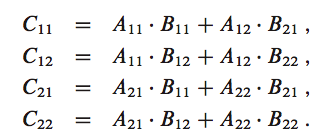Just seeing the algorithm it may not be clear why addition step is taking theta(n^2) time. I also have same confusion that addition should take constant time. With 2*2 matrix in addMatrices() method if we do following change
C[rowC][columnC] = A[0][0] + B[0][0];
then also it give same result.
But once we take 4*4 matrix then can see there will be some addMatrices() method call happening from call stack which is adding more than one element from matrices A and B. That is why addition is needed to be run inside loop.
After implementing the program it is much easier to understand. I have tried to explain, for details please refer method comments.
package matrix;
/***
* Square Matrix multiplication(2^x) using divide and conquer technique
*
* @author kmandal
*
*/
public class MatrixMultiplication {
public static void main(String[] args) {
int[][] A = { { 1, 2 }, { 3, 4 } };
int[][] B = { { 5, 6 }, { 7, 8 } };
int C[][] = squareMatrixMultiplyRecursive(A, B);
for (int i = 0; i < C.length; i++) {
for (int j = 0; j < C.length; j++) {
System.out.print(C[i][j] + " ");
}
System.out.println();
}
}
private static int[][] squareMatrixMultiplyRecursive(int[][] A, int[][] B) {
return squareMatrixMultiplicationDNC(A, B, 0, 0, 0, 0, A.length);
}
/**
* <pre>
* Let A and B are 2 square matrices with dimension 2^x
* A = [
* A00 A01
* A10 A11
* ]
* ,
* B = [
* B00 B01
* B10 B11
* ]
*
* C be another matrix stores the result of multiplication of A and B.
*
* C = A.B;
*
* C = [
* C00 C01
* C10 C11
* ]
*
* where
* for C00 calculation, elements in 0th row of A and 0th column of B considered
* C00 = A00*B00+A01*B10;
*
* for C01 calculation, elements in 0th row of A and 1st column of B considered
* C01 = A00*B01+A01*B11;
*
* for C10 calculation, elements in 1st row of A and 0th column of B considered
* C10 = A10*B00+A11*B10;
*
* for C11 calculation, elements in 1st row of A and 1st column of B considered
* C11 = A10*B01+A11*B11;
*
* Here we are using index based calculation,
* hence time complexity for index calculation is Theta(1).
*
* We have divided the problem into 8 sub-problems with size n/2.
* Hence the recurrence for this divide part is: 8T(n/2).
*
* Additionally we need to consider the cost of matrix addition step,
* which is Theta(n^2). For more details refer addMatrices() method.
*
* Hence the recurrence relation become
* T(n) = Theta(1) + 8T(n/2)+ Theta(n^2);
*
* Applying Master theorem,
* the time complexity of this algorithm become O(n^3)
* </pre>
*
* @param A
* @param B
* @param rowA
* @param columnA
* @param rowB
* @param columnB
* @param size
* @return
*/
private static int[][] squareMatrixMultiplicationDNC(int[][] A, int[][] B,
int rowA, int columnA, int rowB, int columnB, int size) {
int[][] C = new int[size][size];
if (size == 1) {
C[0][0] = A[rowA][columnA] * B[rowB][columnB];
} else {
int newSize = size / 2;
// calculate C00 = A00*B00+A01*B10;
addMatrices(
C,
squareMatrixMultiplicationDNC(A, B, rowA, columnA, rowB,
columnB, newSize),
squareMatrixMultiplicationDNC(A, B, rowA,
columnA + newSize, rowB + newSize, columnB, newSize),
0, 0);
// calculate C01 = A00*B01+A01*B11;
addMatrices(
C,
squareMatrixMultiplicationDNC(A, B, rowA, columnA, rowB,
columnB + newSize, newSize),
squareMatrixMultiplicationDNC(A, B, rowA,
columnA + newSize, rowB + newSize, columnB
+ newSize, newSize), 0, newSize);
// calculate C10 = A10*B00+A11*B10;
addMatrices(
C,
squareMatrixMultiplicationDNC(A, B, rowA + newSize,
columnA, rowB, columnB, newSize),
squareMatrixMultiplicationDNC(A, B, rowA + newSize, columnA
+ newSize, rowB + newSize, columnB, newSize),
newSize, 0);
// calculate C11 = A10*B01+A11*B11;
addMatrices(
C,
squareMatrixMultiplicationDNC(A, B, rowA + newSize,
columnA, rowB, columnB + newSize, newSize),
squareMatrixMultiplicationDNC(A, B, rowA + newSize, columnA
+ newSize, rowB + newSize, columnB + newSize,
newSize), newSize, newSize);
}
return C;
}
/**
* Matrix I represented by 2 dimensional array hence for addition of 2
* matrices, need to fetch same element from both the matrices and then
* add them. Traversing 2D array mean need to access elements by row and
* column index thus need to loop inside loop. Hence time complexity of
* addition is Theta(n^2)
*
* @param C
* @param A
* @param B
* @param rowC
* @param columnC
*/
private static void addMatrices(int[][] C, int[][] A, int[][] B, int rowC,
int columnC) {
int n = A.length;
for (int i = 0; i < n; i++) {
for (int j = 0; j < n; j++) {
C[i + rowC][j + columnC] = A[i][j] + B[i][j];
}
}
}
}
Output:
19 22
43 50
 I understand that the algorithm uses 8 multiplications and 4 additions with time-complexity:
I understand that the algorithm uses 8 multiplications and 4 additions with time-complexity:




